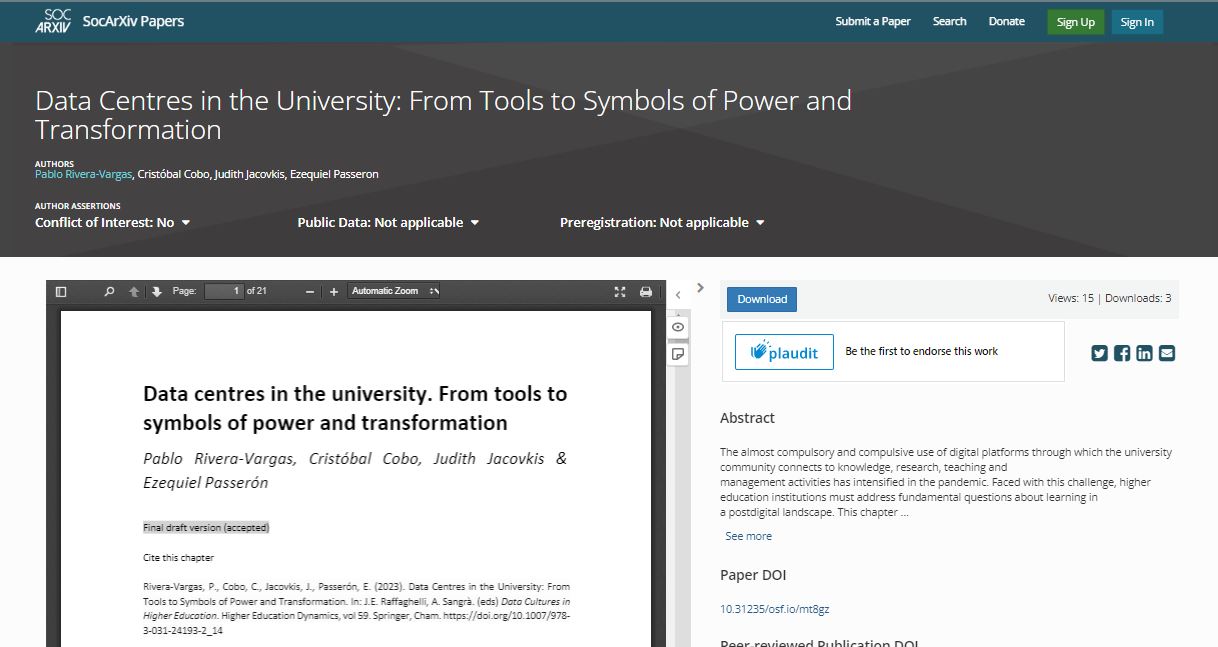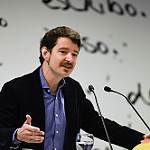New publication: Data, Tools and Power
 Biblioteca Vasconcelos, Mexico City.
Biblioteca Vasconcelos, Mexico City.
Data Cultures in Higher Education: Emergent Practices and the Challenge Ahead: This is the new book edited by Juliana E. Raffaghelli, Albert Sangrà which discusses transformative practices from higher education in response to datafication. This book brings together 27 experienced scholars from Latin America, Europe, North America and China.
The book draws on a range of studies covering the higher education response to the several facets of data in society, from data surveillance and the algorithmic control of human behaviour to empowerment through the use of open data. The research reported ranges from literature overviews to multi-case and in-depth case studies illustrating institutional and educational responses to different problems connected to data.
*How to cite the book?
- Raffaghelli, J. E., & Albert, S. (2023). Data Cultures in Higher Education. Emerging Practices and the Challenge Ahead. Higher Education Dynamics, 59, 1-396.
One of the chapter of the book is called Data Centres in the University: From Tools to Symbols of Power and Transformation, Pages 329-353. This chapter was written by Pablo Rivera-Vargas, Cristóbal Cobo, Judith Jacovkis & Ezequiel Passerón.
What did we learn after our analysis of 31 websites affiliated to university datafication centres?
- The almost compulsory and compulsive use of digital platforms through which the university community connects to knowledge, research, teaching and management activities has intensified in the pandemic. Faced with this challenge, higher education institutions must address fundamental questions about learning in a postdigital landscape.
- This chapter explores how universities have created or adapted research centres to deal with data generation in their day-to-day activities.
- Although the centres analysed in this chapter have different profiles and expertise, they all seek to better prepare higher education institutions to cope with the datafication of society manifested in different ways (e.g. digital inclusion, artificial intelligence, privacy, ethical use of data, etc.).
- Based on a co-design and virtual ethnography, this work is structured in two phases: (1) identification and analysis of 31 websites affiliated to university datafication centres and (2) selection and deepening on four core dimensionsof work of these centres.
- These comparative results highlight global trends, research agendas and priorities, but also illustrate the need to move towards a more multidisciplinary approach, understanding data not only as “tools” but also as “subjects” with an increasingly economical and symbolic power.
- This work highlights that it is critical to better prepare the institutional agenda for consolidating or expanding capacities within higher education institutions in all the core dimensions examined (research, education, political strategy and institutional capacities).
- Short- and long-term plans will be critical for the years to come. Research centres and agencies will require to adopt more flexible governance models to work within their institutions. Closed, or siloed, institutional designs won’t be enough to face the challenges ahead...

Access in SocArXiv the "draft accepted version" of the chapter is available here (in Open Access): https://osf.io/preprints/socarxiv/mt8gz/
How to cite the chapter:
Rivera-Vargas, P., Cobo, C., Jacovkis, J., & Passerón, E. (2023). Data Centres in the University: From Tools to Symbols of Power and Transformation. In Data Cultures in Higher Education: Emergent Practices and the Challenge Ahead (pp. 329-353). Cham: Springer International Publishing.
In the same field, another recent work (in Spanish):
Rivera-Vargas, P., Jacovkis, J., Passerón, E., & Cobo, C. (2023). Centros universitarios para el estudio de datos. Responsabilidad y justicia institucional en una sociedad plataformizada. Profesorado, Revista De Currículum Y Formación Del Profesorado, 27(1), 175-197. https://doi.org/10.30827/profesorado.v27i1.24643
.jpg)
Posted on Mar 10, 2023




